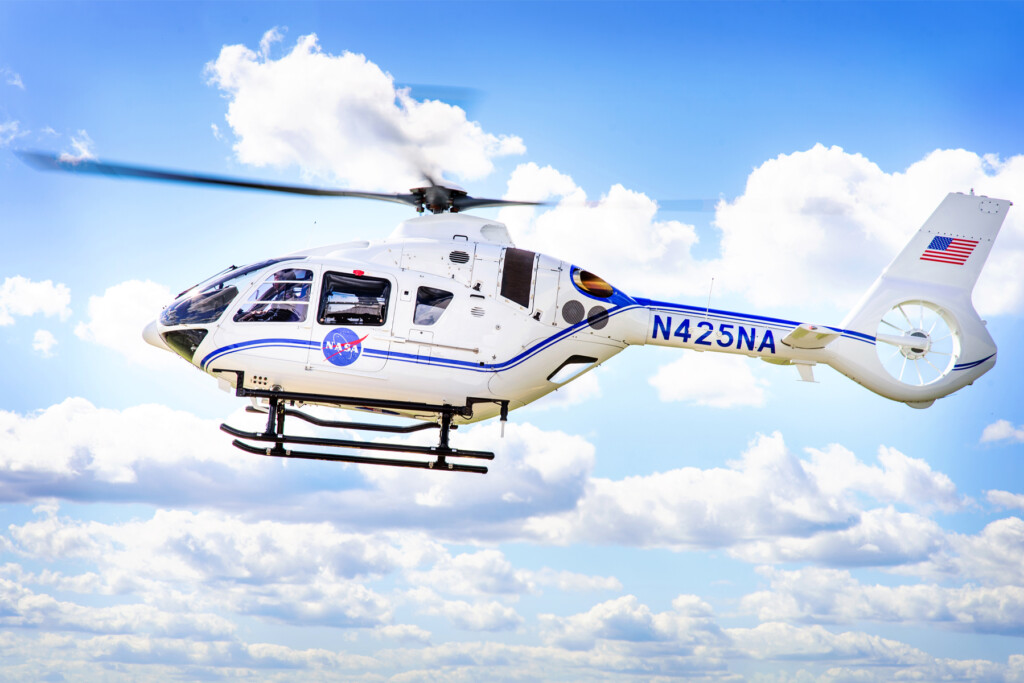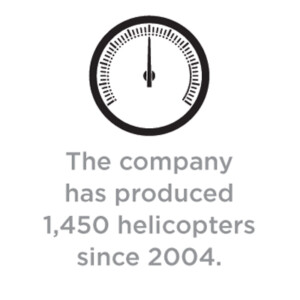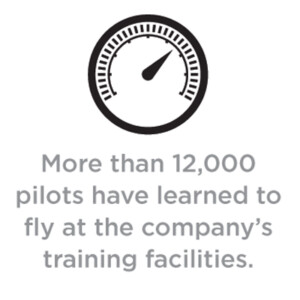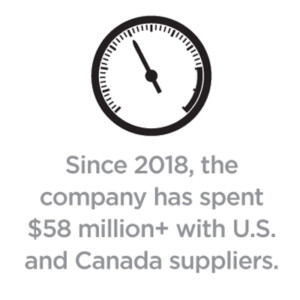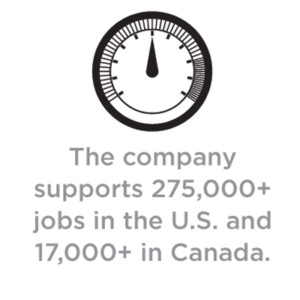Standing inside a delivery facility in Grand Prairie, Romain Trapp realized the full impact of his work leading Airbus Helicopters North America. In the beginning, he thought its primary value was in connecting people. But as he watched roughly a dozen nurses smiling through tears at a delivery ceremony for the hospital’s newest choppers, Trapp knew his career’s larger purpose. “It was the first time I understood what helicopters are about—saving lives and protecting people,” he says.

Trapp joined France-based Airbus 25 years ago and has held eight roles in four countries during his tenure. Now, as president and regional head of the company’s North American helicopter headquarters in Grand Prairie, he oversees more than 1,000 employees in the U.S. and Canada. Since taking the helm, he has guided Airbus Helicopters to become a market leader that generated more than $1.1 billion in revenue last year.
He grew up in Buhl-Lorraine in France’s wooded northeast, spending summers caring for his neighbors’ farm animals and preparing livestock feed. “My parents were not farmers; they were nurses,” Trapp says. “But we had farms all around us.” Back then, the potential he had to one day lead within a global corporate enterprise was hidden, even to him. He stood barely five feet tall until his senior year in high school when he shot up more than a foot, was very shy, and “didn’t have a lot of ambition.” He thought he’d be a banker at the small bank in the next town over or work at a financial institution in the closest city. “The change, the job, and the ambition came step by step,” Trapp says.
The change came after Trapp graduated with his second master’s degree in economics and finance at École Normale Supérieure in Paris. A newlywed, he moved to Toulouse in the south of France and began looking for work while his wife finished her Ph.D. in business management. “I looked on the map and I said, ‘What are the companies in Toulouse?’ and I said, ‘Oh! There is Airbus. I’m going to work for Airbus,’” Trapp recalls.
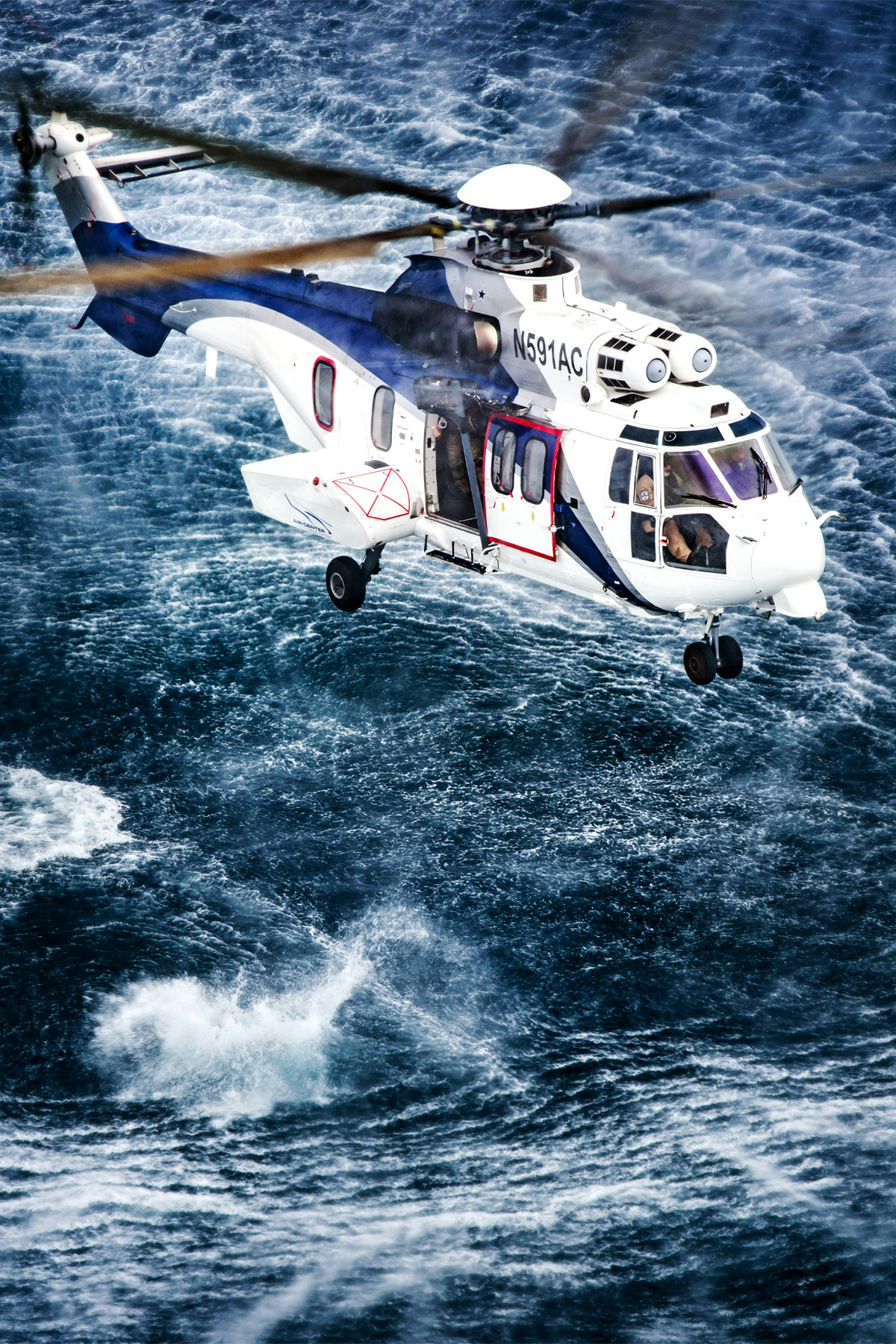
It was a bit spontaneous and not the banking role he was working toward, but Trapp landed an interview with Airbus’ deputy CFO for a post as a cost accounting manager. The executive reviewed Trapp’s resume and asked why he’d prefer to work at Airbus when his background lent itself so obviously toward banking. “I explained that for me, it was important to make a connection between the figures I would be dealing with as a finance guy and a product we can touch and feel and that makes me dream,” Trapp says.
He secured the job and moved into an office overlooking the final assembly line of the Airbus 320 airplane—the best-selling single-aisle fleet worldwide. Three years later, he was promoted to business controller. His ascent then took him to one of the company’s global divisional headquarters in Munich, where he served as corporate controller of the airplane division. By the end of his first decade of work, he was back in France, overseeing more than 400 employees and 30 offices and subsidiaries worldwide as VP of controlling and administration. “Then, one day, I got a call saying, ‘Romain, you have been put on a short list to become the chief financial officer of Airbus Helicopters in the U.S.,’” he remembers.
Trapp was not familiar with the helicopter market and never thought about moving to the states—let alone Grand Prairie, Texas. His impression of the Lone Star State centered around longhorns, cowboys, and the countryside. “In Europe, it’s all about ‘Dallas,’ the series,” he laughs. “I thought about the ranch.” He knew he could make the jump from airplanes to helicopters but was worried about fitting in with the American culture.
Trapp called former Airbus Helicopters CEO Christian Gras for advice. Gras assured him he was right for the role. “He said, ‘The way you think, the way you interact, being business-minded, your customer focus—you would fit perfectly in the U.S.,’” Trapp recalls. “We moved here, and my family and I loved it.”
Hitting Turbulence
When Trapp became CFO of Airbus Helicopters North America in August 2008, it was flying high. “We had the best results in the company and were growing like crazy,” Trapp says. Then, the economy crashed, and he was forced to go into crisis management mode less than a month into his first C-Suite post. He didn’t know it then, but each promotion he received moving forward would correspond to extreme economic hardship.
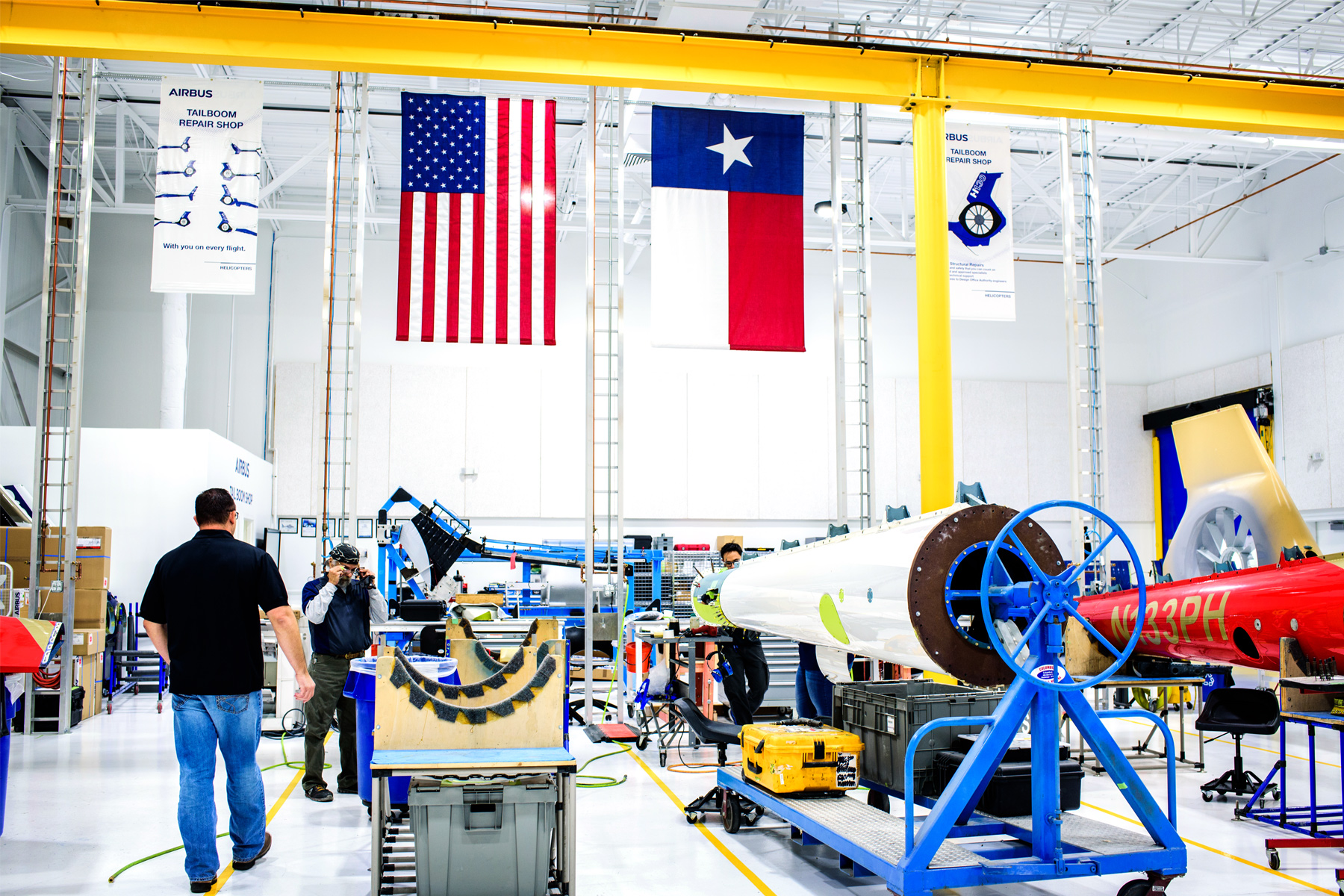
The 2008 financial crisis provided an opportunity for personal growth, Trapp says. “I had to learn the customer side of the business, because right away, I was negotiating conservation contracts with some of our customers,” he says. To know which costs to cut, he also had to master the nuances of the helicopter business model and its operations. “If you don’t know the business, what you are going to do is stupid,” he says. “It forced me to learn what makes sense and what doesn’t.” With Trapp’s help, Airbus Helicopters North America emerged from the crash even stronger. “At the end of the day, a crisis is an opportunity to be better,” he says.
He continued as CFO for four more years, helping Airbus Helicopters reach $800 million in annual revenue. “We were generating more profit and more cash while increasing market share, so it was win-win-win,” he says. The growth came in large part from the company entering the military market. It has since sold more than 465 choppers to the U.S. Army.
The conventional flight pattern for Trapp as a regional CFO would have been to return to Europe to take a larger finance role at Airbus’ global headquarters. But the customer-facing experience he gained during the financial crisis exposed him to an operations mindset he wanted to further explore. “I knew customers, and I liked it, and I was not so bad at it,” Trapp says.
But he faced a challenge; nearly all the company’s chief executives, whether they run small or large divisions within Airbus, have traditionally been engineers. What he lacked in technical knowledge, he made up for in customer relations and business savvy. “Because I got involved as a CFO into operations, understanding the business in order to support the business, I was able to check a certain number of boxes,” Trapp says.
Airbus Helicopters’ Markets
Industry leader Airbus Helicopters has worked on more than 3,070 in-service aircraft, serving a wide variety of purposes.
Here are its top revenue-producers:
- The U.S Army
- Hospitals
- Police and Search and Rescue
- Utility
- Private and Business Aviation
Airbus Helicopters has delivered more than 465 of its UH-72 Lakota helicopters for army missions. Choppers are produced in the company’s facility in Columbus, Mississippi; pilots are trained at Airbus Helicopters’ Fort Rucker Training Center in Alabama; and aircraft are maintained at the regional support and services hub in Grand Prairie.
Airbus Helicopters is the market leader for emergency medical services helicopters. They can reach the scene of an accident three to five times faster than ground vehicles, bringing patients to medical facilities quickly and safely.
Ten Airbus helicopters have been delivered to the Canadian Royal Mounted Police, more than 100 to U.S. Customs and Border Protection, and many more have gone to city police and law enforcement.
This segment encompasses helicopters produced for firefighting missions, power line and building maintenance efforts, oil, gas, and mining, and more.
The billionaire market became the number three sales producer for Airbus in 2022 (fifth overall in revenue). Among its affluent clients is Jerry Jones, whose helicopter can often be seen at Cowboys games.
When the position of president and CEO of Airbus Helicopters’ facility in Canada opened, Trapp was offered the job, paving the way for future interdisciplinary leaders at Airbus. “Several people after that who worked with me in finance have been taking general management positions to help us all over the world,” he says. He arrived in Canada in 2013 to lead more than 250 employees in a country with the world’s second-largest helicopter fleet.
But inclement conditions surfaced within Trapp’s first year piloting as CEO: the oil price plunge of 2014 decimated the Canadian helicopter market. “Most of the helicopters flying in Canada are flying for mining and oil and gas,” he explains. Additionally, the helicopter market is often cyclical, Trapp says, and at that point, there was a downswing in demand worldwide.
Airbus Helicopters Canada’s profitability plummeted, and closing the facility became a possibility. Helicopter maintenance and parts sales provided some cash, but it wasn’t enough. Trapp’s team had to get creative. “We started thinking out of the box and said, ‘Our traditional helicopter business is going down. We know that it’s going to recover at some point. The question is, how do we survive until it recovers? Can we do something else?’” he says.

A large component of Airbus Helicopters’ Canadian hub is its manufacturing facility, and Trapp’s team decided to leverage these features to make a temporary move into automotive. “We went after a contract and went into manufacturing in composite for the body of the Ford GT,” he says. “It had nothing to do with Airbus and nothing to do with helicopters, but we had the capability.”
This also allowed the leader to avoid mass layoffs and damaging morale while helping Airbus Helicopters bounce back. “Especially with a mature business, we have the tendency to become complacent,” Trapp says. “A crisis forces you to challenge yourself, but the best is to challenge yourself on a continuous basis.” Demand for law enforcement and medical helicopters in Canada recovered enough for the company to exit the automotive arena in 2018.
Halfway through his six years leading Airbus Helicopters Canada, Trapp was asked to serve as COO of Airbus Helicopters North America concurrent with his Canadian CEO role. The dip in demand that was impacting the Canadian helicopter market reached the U.S. The company needed a crisis conqueror. “It was a mix of me being ready to take on another challenge in North America and the company going through a bit of turmoil and needing to bring my experience back,” he says.
He decided to commute between Grand Prairie and Niagara Falls, searching for new markets in the U.S. the same way he did in Canada. After some thought, his team in the U.S. decided to break into the private and business aviation niche. “Basically, billionaires,” Trapp explains. “We brought a fair number of people into the helicopter business who decided to enjoy the added value of a helicopter in addition to their jet. This led us to grow our sales, and at the time, we needed to.”
He helped maintain a strong performance at both the U.S. and Canadian facilities until 2019, when he was offered the top role for North America, operating full-time out of Grand Prairie. “It was both the job I wanted and the job I had unconsciously been preparing for,” Trapp says. He accepted, then just a few months later, the COVID pandemic hit. “After the third crisis, the first thing you ask yourself is, ‘Is it me?!’” Trapp jokes.
This time, navigating a crisis meant steadying operations so that law enforcement, emergency medical services, search-and-rescue, and more could continue saving lives. Keeping composure was key. “There is a definition of leadership that I like that says: ‘A leader is someone who is importing stress and exporting energy,’” Trapp says. “Especially at a time of crisis, if you are stressed, and you show your team that you’re stressed, then the team is going to be stressed, and that’s just a recipe for failure.” Demand dropped some, but the helicopter market stabilized within the first six months of the pandemic.
Now, having navigated through three crises and driving Airbus Helicopters North America past $1 billion in revenue, Trapp has his sights set on the future—in a big way. Two of his goals for the company include capturing more government agencies as customers and improving sustainability. But another goal is a bit more eccentric. “It’s about a potentially big addition to the helicopter market, which is going to be around urban air mobility or electrical, vertical takeoff lift,” Trapp says. “In the nontechnical world—flying cars.”
Airbus’ Economic Takeoff
Airbus Helicopters North America is an aviation powerhouse.
Here are a key few stats:
The company is preparing for these autonomous and electric vehicles to become widely used in the next decade. “We are in our third round of prototypes,” Trapp says. He thinks the vehicles will serve a function similar to a taxi, shuttling people from place to place rather than replacing current uses for helicopters. “I don’t see the technology being mature enough for a while,” he says. So, what’s the next destination on Trapp’s personal flight plan? “I love this job. I always ask, ‘OK, Romain, what’s next?’ and I say, ‘I love this job,’” he laughs.
Get the D CEO Newsletter
Author



